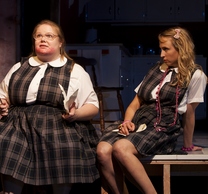SITE GUIDE
REVIEWS
REVIEW ARCHIVES
ADVERTISING AT CURTAINUP
FEATURES
NEWS
Etcetera and
Short Term Listings
LISTINGS
Broadway
Off-Broadway
NYC Restaurants
BOOKS and CDs
OTHER PLACES
Berkshires
London
California
New Jersey
DC
Philadelphia
Elsewhere
QUOTES
TKTS
PLAYWRIGHTS' ALBUMS
LETTERS TO EDITOR
FILM
LINKS
MISCELLANEOUS
Free Updates
Masthead
A CurtainUp Review
How to Make Friends and then Kill Them
| "Will you bruise me so Mom will pay more attention to me?"— Ada
|

Jen Ponton & Katya Campbell (Photo: Hal Horowitz)
|
We meet sisters Ada (Katya Cambell) and Sam (Keira Keeley) as young girls, left to themselves in a sterile kitchen lined with liquor bottles by an alcoholic mother. They inhabit a strange universe with its own set of rules, one governed by routine and hierarchy. Sam worships Ada, while Ada only worships herself. Preening and theatrical, she can be sugary sweet one moment, even balletic in her movements, and monstrously dictatorial the next. Sam, conversely, is tomboyish and intense. Both their behavior is stilted — when they laugh or express affection it's as though they learned to do it from a textbook.
The creepy cellar door menaces, complete with sound effects and lighting cues, hinting at something sinister. The set's walls, covered with cotton candy-like pink insulation, give the impression that the fabric of this strange, yet established, reality might come apart at any moment.
And in a sense, it does, when Ada meets the outcast Dorrie (Jen Ponton) at school. Innocent and almost obscenely self-effacing, she takes to Ada quickly and wholeheartedly, like a disciple to a messiah. In the role, Ponton manages to be loveable, but almost unsettlingly so, like the puppy that craves love even after it's been kicked.
Sam, formerly the only person in Ada's life, resents the competition. The play charts the growth of these strange bedfellows in chapters, from adolescence to young adulthood. As time passes, their circumstances change. Sam and Dorrie go to college, leaving Ada to self-destruct back at home. Sam continues to resent Dorie and berate her, until an accident brings them close together — though, bizarrely, in the exact same form of unhealthy relationship Dorie previously shared with Ada.
What doesn't budge is each of the character's unusual dependence on one another, and concurrently, their need to control and possess each other. While this quality may seem slightly charming in childhood, it gets increasingly distressing as the characters age. Their appeal likewise, begin to sour over time, as the distinctive traits that seemed humorous initially come more and more to resemble deep scars.
It's something that can be said of the play in general, which possesses the same grating effect of a joke, repeated ad infinitum, until it loses. Ada, Sam and Dorie seem forever trapped by their own identities, and by each other. The insularity of their world leaves them little room to grow. Ultimately, the lack of oxygen that keeps them so well preserved has its impact on the audience, which may find itself feeling similarly claustrophobic.
The play's title points to even stranger, darker turns in its plot, which serve only to make these characters come across more like abstractions. The strong performances by Ponton, Keeley and Cambell, however, give them life, earning them sympathy and interest, even if it's not quite clear where to place it.
|
How to Make Friends and then Kill Them Written by Haley Feiffer Directed by Kip Fagan Cast: Katya Cambell (Ada), Keira Keeley (Sam), Jen Ponton (Dorrie) Set Design: Andromache Chalfant Lighting Design: Tyler Micoleau Sound Design: Daniel Kluger Costume Design: Jessica Pabst Production Stage Manager: Michael Denis Production Manager: Eugenia Furneaux Running Time: 90 minutes Rattlestick Playwrights Theater, 224 Waverly Place, New York, NY 10014 rattlestick.org (866) 811-4111 Beginning 10/27/2013, opening 11/7/2013, closing 11/24/2013 Performance times: Mondays and Wednesdays at 7pm, Thursdays and Fridays at 8pm, Saturdays at 2pm and 8pm, and Sundays at 7pm Ticket cost: $10-$55 Reviewed by Jordan G. Teicher at 11/2/2013 performance. |

|


 Book of Mormon -CD
Book of Mormon -CD